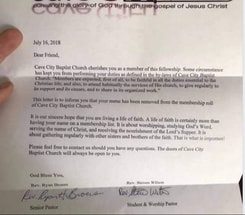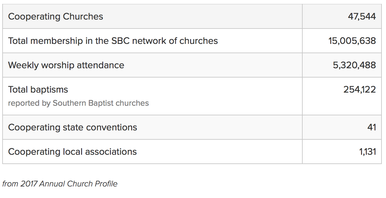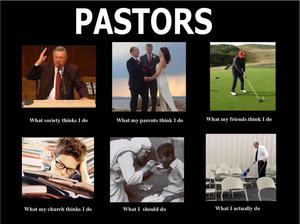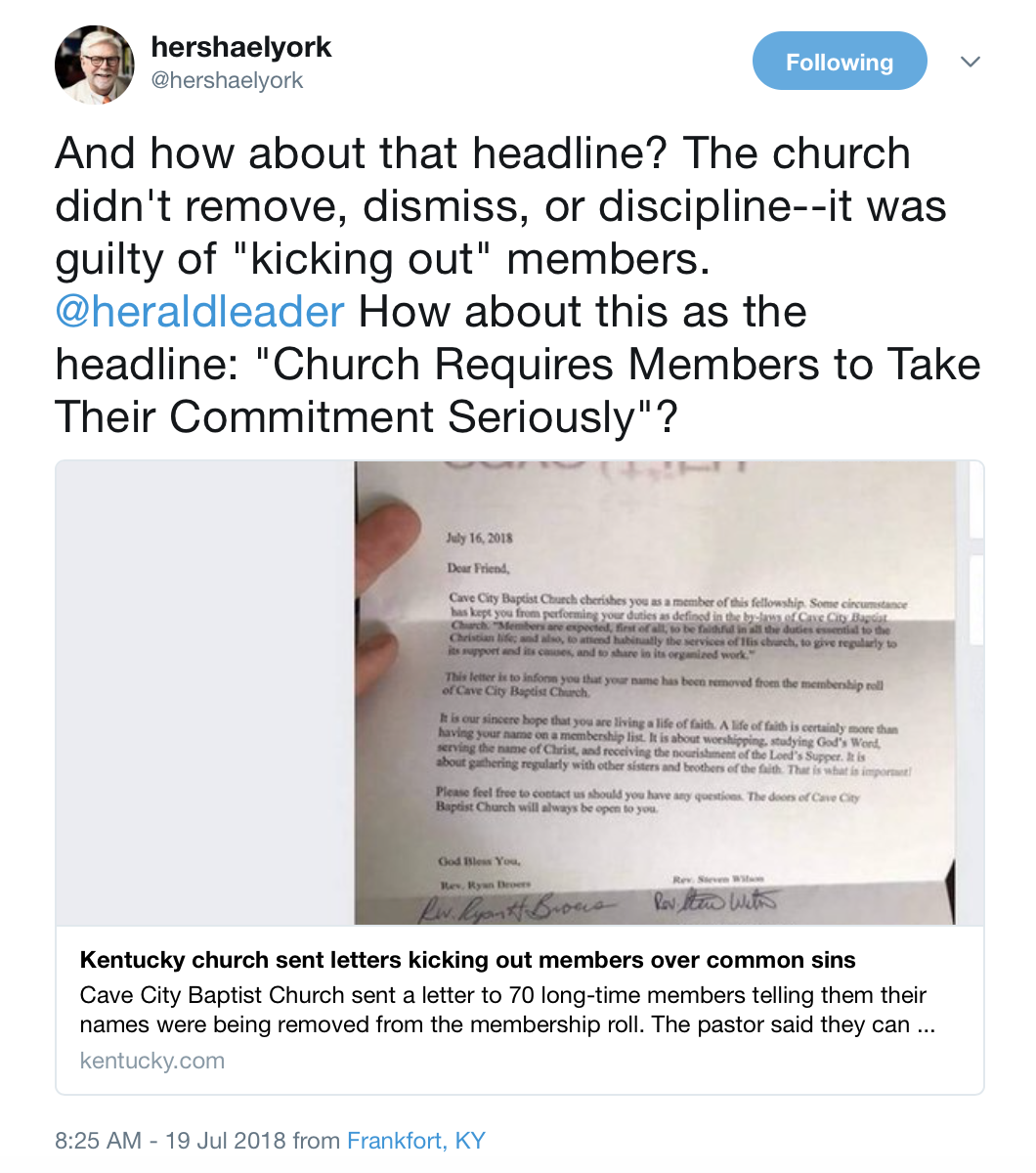 Last night my heart was grieved yet again as I read (yet again) another essay from an older SBC statesman lamenting that things "ain't what they used to be." With more straw men and mischaracterizations and a healthy dose of fear mongering, I was grieved not because of how the Convention is portrayed or how its trajectory is mislabeled.  I was grieved because again I found myself saying "Is this really how you want to go out?" Several years ago during our national meeting, one of the architects of what can only be described as the miraculous Conservative Resurgence took his final address and stomped his feet about the changes he didn't like being proposed. Earlier this year we watched a tragedy unfold as a denominational hero dug in his feet and stomped and kicked. AFA published a hit piece on the newly elected SBC president and stirred up a storm predicting that it won't be long before the SBC descends into cultural liberalism. SBC entities are put under fire and accused of being accomplices with Soros and his global takeover. As a Millennial pastor, can I make a plea to our predecessors? Don't go out like this. Don't sacrifice an entire lifetime of faithful service and personal cost. Don't give up an entire generation of labor and honor, taking the high road and preserving biblical fidelity. Please.
We are not liberal - One of the accusations lobbed at the shift in SBC involvement and leadership is that it's "liberal," whether it's cultural or theological. Predecessors, we are not. We are committed to historic orthodoxy, the orthodoxy you taught us. We are committed to biblical inerrancy, the same inerrancy you worked to reclaim. We are committed to the exclusive salvation through Christ, the same you preached to us that we heard and responded to. We have been taught and trained under an entire generation of professors and pastors who affirm without reservation key fundamental documents and theological positions. What you labored for theologically is safe. We are not social gospel - Unfortunately the GA Baptist article pushed a view that the SBC and its younger leadership is moving towards a social gospel. But we cannot divorce the evangelistic commands of Mark 16:15 to "preach the gospel to every creature" from the call of Micah to "do justice, love mercy, and walk humbly with God." We cannot separate John 3:16 from James 1:27. We cannot put into conflict Romans 10:13 and Matthew 25:40. The same Bible that tells us that we are to go to the ends of the earth on mission is the same Bible that tells us to defend the cause of the weak and fatherless. It's a legacy we inherited from you to do disaster relief, provide food pantries, collect for benevolence, to volunteer in schools, to do clothing drives, and to host Cub Scout packs. We are not feminist - One of the central moves of the Conservative Resurgence was to return to a biblical model of pastoral ministry laid out in 1 Timothy 3 and Titus 1 - that the office of pastor is reserved for qualified men. The backlash to the effort among many in the SBC to try to find ways to engage women in leadership has prompted many to question if women should be pastors. None of us are saying that. None of us, not even the women who are providing a voice for inclusion, are saying this. We are applying the same hermeneutics you taught us, to let Scripture speak. And it does. Women have a function and role in the church: Phoebe, Priscilla, Junia, and others did more than operate fellowships and walk around barefoot & pregnant. So when we recognize the giftedness and calling of women in the church, we recognize both what God has gifted them with and also the boundaries placed on the pastoral office.  You will not be cast aside - My fear is that many who hang on too tight or who go out kicking and screaming do so because they think they will be cast aside. Please don't feel this way. We want you, not just for your wisdom but for your friendship and impact on our lives. We want to learn how to be better pastors, better preachers, better counselors. And we need you more than you know. We learn a lot in seminary about exegesis, but it takes a seasoned mentor to show us how to hold a widow's hand as her husband of 60 years dies in front of us. It takes a seasoned mentor to help us navigate change in established churches. We need you. You will always have a place, you always have a seat at the table. We love you. We're grateful for you. We cannot say enough how much we appreciate the hard work and sacrifice you made. We will take care of what you built. It won't look exactly like you built it, because each generation leaves its imprint on its legacy to pass down. But it will be cared for well, because we, like you, will stand before King Jesus and give an account for how we cared for His Bride. So please, my dear brothers and sisters, don't go out like that.
2 Comments
 Lay off grammar police, it's Monday. But beyond the awful structure of that title, it's a helpful reminder of one of the most important words a leader can learn to say: no. I get it, we don't like saying no. We like validating people's ideas and passions. We don't like conflict. We like seeing new things start. We don't like stifling creativity. But we can't say yes to everything. We can't jump at every opportunity, even if it's a great one. Leaders have to say no when it doesn't fit the mission/vision/purpose/strategy - You cannot do everything you want to do. That's something you have to recognize quickly or else you'll burn out and overstretch yourself. Neither can your church. You don't have enough time, volunteers, money, facilities, or resources to do everything. So you have to funnel ideas and initiatives through the filters of mission, vision, purpose, and strategy. Does it fit with what you're called to? How you're doing it? Where you're going? What you're doing? If not, say no. Don't force a fit where it's not supposed to be. Leaders have to say no when it requires more than you can give - Jesus told a parable about two builders, and the wise one was the one who counted the cost before beginning. Many times churches fall into "new puppy" syndrome with new ideas. Just like a kid promises to take of the puppy, new ideas spark short-term interest and excitement. But after that fades, mom is left picking up the chew toys, and the church is on the hook for a commitment they didn't really want or could handle. What are the short term (and long term) costs? What people needs are there? Do you have strong volunteers who can fill the gaps? Leaders have to say no but try to find a yes - It's hard to say no, but when we do we should try to find a yes somewhere. Not every idea is a terrible one. You'll get those too. But most of what people bring to consider are good ideas from a good heart. The idea might not fit the filter, and it may be more than what you think the church can provide. The response then is to try to find a way to make a yes: 1. Existing - A lot of times we need to say no because it already exists. Is there something you can direct the person to that's already happening? 2. Redirect - Maybe there's a ton of zeal for door-to-door evangelism, but you live in an area with a lot of deed restricted communities that forbid soliciting. In something like that, redirect their focus towards one-on-one evangelistic training, towards equipping people to serve and share with their neighbors. Don't stifle their passion, but find a way to make it work if it fits the filter. 3. Accommodate - Accommodation isn't bad on its own. It becomes bad when it morphs into enabling bad behavior. But sometimes we need to accommodate an idea for it to work. It's possible that with some wiggling and adjusting, a new idea can spark existing ministries and provide a catalyst for impact. Leaders have to say no, and hold their ground loosely - I don't think leaders have to put lines in the sand and not budge when they say no. When we die on our hills, we need to make sure they're worth dying for, and not anthills we've staked our flags on. It's hard to say no--you'll hurt people's feelings, you're going to disappoint them, and you might even face criticism or backlash for it. But leaders have to make those hard decisions. All that said, hold the ground loosely. Don't dig in unless you have to. Take a step back, pray, think, ask around, and don't be too proud to give back ground. What do you do as a leader when you have to say no?  The social media outrage patrol turned its attention last week to a small church in Central Kentucky that had sent out letters to a large number of inactive members stating their removal from the membership roll. Once the Lexington Herald Leader got ahold of it, the headline became an over-sensationalized "Kentucky Church Kicks Out Members Over Common Transgressions." The article itself was a lesson in bad theology and sloppy reporting, which was called out by Hershael York of Buck Run Baptist in Frankfort.  Here's one of the realities of our denominational tribe in the Southern Baptist Convention: we have ridiculously inflated membership rolls. Take a look at this infograph from the SBC website which shows the number of members on our rolls vs. our average weekly attendance. In any given Sunday, an average of nearly 10 million people who claim membership in an SBC church are absent. If we take into consideration a fairly conservative estimate that our weekly attendance is roughly 75% of our active membership (factor in vacation, kids sports, sickness, travel, work, and other factors that occasionally hamper church attendance) we're left with an "Active Membership" of roughly 7 million. Not even half. We can discuss the causes of this another time, but what many of us in ministry are finding is that our church records are horribly inaccurate. We have members on our rolls who have moved away, who we've lost contact with, and in some cases who are already dead. What Cave City Church did was nothing more than update its roll sheet to accurately reflect its current involvement. A lot has been said about those who are homebound or unable to attend because of illness or nursing home situations. If they have been removed from membership, then Cave City has an obligation to restore that. Our members who are homebound or unable to attend still are part of the family. Hopefully the leadership at Cave City is working to make sure those who have been removed have been removed for the right reasons. That said, I defend what Cave City Baptist Church did. They're getting blasted for it, unfortunately for all the wrong reasons. Here are my 4 reasons why what they did was right. Faithful Church Membership is Biblical - When we read Hebrews 10:24-25 we see that there is an expectation for corporate attendance because the exception are those who "neglect to meet together." In Acts 2:42-47 we see the regular (daily) gathering of Jesus' followers for worship, ministry, prayer, fellowship, the Lord's Supper, and pastoral care. Matt Chandler from Village Church has a great essay from 9Marks about the biblical argument for church membership. And Thabiti Anyabwile has a book on what a healthy church member looks like. Pastors Have a Responsibility for Their Flock - One day I'll have to stand before the Lord and answer for how I as a pastor cared for those God has given to me. How do we know for whom we will give an account? Biblical church membership. Hebrews 13:7 talks about the hope for leaders to have joy about them as they lead and care for those entrusted to them. The only way to recognize the parameters of who is and who isn't part of the flock is through membership. Church Membership is a Covenant Relationship - When we join a church, we're not just slapping our name on a list or being able to use the gym for free. We're joining together with a people for encouragement, love, fellowship, instruction, and edifying. Sometimes that edifying takes the form of correction, where our mistakes and shortcomings are lovingly handled through the teaching of the Word and the work of God's people. Sadly, so many people (and churches) treat membership without the level of covenant commitment it requires. Restorative Church Discipline is Biblical, and Good - Whenever we see stories like this or others where people are "excommunicated" from a church, we immediately throw up our guard and get mad and say things like "Jesus would never be ok with this!" Well... He was. And He told us how to do it. Matthew 18 gives us a plan for restorative church discipline. It's important to emphasize the restorative part. It's not punitive. It's not being mean. It's restorative. It's restorative of the relationship between the person to God--if there has been unrepentant sin that has fractured the relationship between that person and God, the process of confrontation and repentance is healing. It's restorative of the relationship between that person and God's people. We were never meant to exist in a bubble, the people of God has always been a communal or corporate identity. So when we pledge our membership to a church, we're part of a body, or a family, and most powerfully the Bride of Christ. What a rich picture of joy. When someone falls away through sin or through constant inactivity, the body isn't whole. That's where the restorative process comes in, which ultimately leads to the removal of someone from what we would consider the membership roll. It's not to punish, it's to leave open the door for restoration. The tough part of all this is that for all we know, Cave City and its leadership are trying to do the right thing by cleaning up their records. It's the honest thing to do. We can't keep reporting these giant inflated membership numbers that are inaccurate. Let's pray that good comes from this, and that for some who received that letter it spurs them to love Cave City Baptist Church, come back into fellowship, and see the mission of God expand from there.  One of the roles that we have as leaders is Chief Storyteller, where we have the opportunity to share and direct the narrative of our church, ministry, or organization. If you think about it, that's all we have. It's not our church. It's not our organization. We're stewarding a position of leadership that has been given to us because of the trust people place in us. We're not going to be in that position forever; all of us are interims. And that's why it's important for us to be urgent in what we want to see replicated. We want to see behaviors, habits, beliefs, and action replicated. We want to see people inviting lost friends, connecting in Gospel conversations, serving in the church and their communities, sacrificially giving, investing in the next generation, building strong marriages, and more. But then those things don't happen. Might I suggest that the reason they don't is that they're not celebrated, so they're not replicated? When we celebrate what we want to see replicated, we're visibly displaying victories that help propel us towards our mission & vision. When we don't, we get frustrated because the status quo continues to reign. But if we don't challenge the status quo by championing values and actions that push the mission, how will anyone know what it looks like? Celebrate Stories & Testimonies - During our weekly gatherings, we'd be remiss if we didn't pause to celebrate what God has done. After all, the stories we're telling aren't about us. We're not the heroes. God is. And God is the one who saves a troubled marriage. God is the one who changes a heart towards generosity. God is the one who cultivates a servant's attitude. Brag on God. He's worthy! Recognize Key Contributors - Typically only a small fraction of the people involved in the success of a ministry are ever visible. The overwhelming number are working hard behind the scenes without the luxury of a spot on the platform. But as the visible leaders, we can change that. I've seen churches recognize a "Volunteer of the Month/Year" or to call up a faithful teacher on their anniversary or do video montages of ministry contributors in action. Or it can be as simple as thanking the people who painted and renovated your fellowship area. Funnel Resources Towards Replication - Church or ministry mission and vision statements only mean what they're willing to fund and support. So whatever we say we value or we say we want to see replicated, if we're not investing people resources, financial resources, facility resources, and undergirding with significant prayer, then we're not really serious about seeing it replicated. But if we truly believe it's important to replicate, then we'll give it the attention and focus it needs to succeed. Privately Appreciate Replicators - So often what happens in our visible, public worship services is a drop in the bucket of what happens in the weekly life cycle of a congregation. Beyond the public cheering for replicators and replication, it's important for us to privately show our appreciation to those who are championing the vision. It can be as simple as the brief conversation I had today with one of our children's Sunday School teachers to thank her for her hard work. It can be a text message or email or a surprise of their favorite Sonic drink. What else can you do to help celebrate what you want to see replicated in a church?  Earlier this week I recorded a podcast episode talking about younger ministry leaders being involved in doing staff evaluations. One of the things I commented on was making sure to use an objective standard for doing those evaluations, the job description. But that opens up a whole other discussion of job descriptions in ministry settings. My suspicion is that many of us are serving in churches and ministries without adequate job descriptions to lay out what is expected. I don't mean this as a knock, churches call faithful pastors & ministry leaders and most of those who are called are faithfully laboring, working 50+ hours a week, and giving their all to their calling. That said, it's crucial to ensure that we have good job descriptions. And in the podcast episode I argued for fluid job descriptions. Much of this comes from Jim Collins' "who then what" philosophy on hiring, that you get the right people on board first and fill the position second. I think there's a lot of carryover to ministry from that mindset. When we bring a leader on board, we're not just filling a role, we're bringing in a person first. We're bringing in a unique gift set, a unique calling, a unique perspective, and a unique expectation. My argument is for job descriptions to be fluid because of three major shifts in ministry life: Circumstances - Maybe the position moved from part-time to full-time or from a dedicated role to a "Slashy" role where responsibilities are combined. No church is able to maintain for its lifespan its current staffing structure. It's just not possible. Ministries grow or shrink, financial health changes, leadership philosophy changes. If a church has experienced significant growth in a particular ministry area to the point that a part-time leader cannot handle the load, it is both foolish and abusive to levy expectations in an outdated job description. Person - You are not your predecessor. And you are not your successor. You are you. Whatever job description you've been given, it likely wasn't written with you in mind. What I'm not arguing for is for a leader to write their own job description, that can be a recipe for disaster. I watched a church do that once and had a key staff member revise his description so much that he had no responsibility and no lines of accountability to deal with those issues. But your job description needs to reflect who you are, your giftedness, your calling, and your abilities. And we as senior leaders in churches and ministries should be willing to adjust our staffing parameters and model based on who God has sent us. Culture - The way we do ministry now is much different than it was in the 1990s or even the 2000s. It's shifted greatly from program-oriented ministry to person/discipleship oriented approach. But in many cases our job descriptions don't reflect that shift. I was handed one in a previous stop that required me to be responsible for a youth choir. Sounds nice but 1) Those were largely a product of the 90s and weren't as common, and 2) I'm completely tone deaf. As the way we do ministry changes, we need to be fluid in our job descriptions to reflect that.  I want to give you 5 suggestions for how to audit your ministry job descriptions: 1. Annual Review - Hopefully your ministry is doing annual staff reviews. Use the job description as the evaluative basis for that, but be willing to ask questions like "Is this job description accurate for what you feel you need to do to be most effective?" or "Are there things we need to consider adding or taking out of this?" 2. Zero on New Hires - Whenever you bring in a new hire, as much as possible start with a Zero Description. Obviously you'll have some general parameters and expectations, but as much as you can start with a blank slate. That way you're seeking to best use a candidate's giftedness when they come on board your team, and will be able to contribute in ways you may not have initially expected. 3. Make Amending Them Easier - If it requires an act of Congress to change your job descriptions, you've made them too complicated to amend. Whatever policy and procedure adjustments you need to do in order to make amending your job descriptions easier, do them. Ours were attached to our Constitution & Bylaws, which required significant time and effort to amend (as they should). But as part of our work of reconstituting and rewriting our bylaws, we intentionally left out job descriptions. Instead, we build a Personnel Manual which can be amended by our Church Council (Leadership Team). 4. Think Person > Position - Whenever we emphasize the position over the person, I believe we turn ministry service into just a job, just a role. Instead, we need to remember that when we have someone on board our ministry team, we're bringing them on just that: our team. So we need to consider someone serving on our team as the goal, not filling a position necessarily. Again, not saying we abandon positions, but we do need to make sure that the person is more than the role. And if you're serving in a senior leadership role and you have a key staff member you want to keep who may not be in the best role, explore the possibility of a role adjustment. A good team is worth hanging on to, more than making sure the roles are filled. *For more on teams and developing a healthy ministry, check out my book Dream Teams 5. Like, Don't Love Them - At the end, it's important that we like our job descriptions but avoid falling in love with them. Things we're in love with are difficult to change because of the emotional attachment to them. Job descriptions are a tool. Use them like one. And don't fall too much in love with a tool, because eventually it will need to be replaced. And an unhealthy attachment to something intended to be used is going to lead to misplaced priorities. What does your church do with job descriptions? 
This week's episode of the U40 Ministry Leaders podcast is about staff evaluations. Many times as younger ministry leaders we find ourselves having to do staff evaluations or being evaluated, and we don't often know how to do them or what they should look like.
In the episode, I wanted to provide a few things to take to do evaluations well, so that they truly become an honest assessment of a leader's performance but also are a way of shepherding and encouraging greater effectiveness. One key distinction is to evaluate on process rather than results. It happens every year that football coaches are dismissed because they simply didn't win enough games. Or in a stock brokerage one trader constantly loses money or costs clients key trades. Those are results. They can be measured and objectified. But ministry needs to be evaluated on process rather than results. Process looks at faithfulness, effort, intentionality, team mindedness, and teachability. For example, a student pastor transforming culture and developing a vision is going to see people leave. It's inevitable. On results, that's a "failure," but on process that's successful. Evaluations should be 360 - It's important to make sure that whenever you do an evaluation, or you're being evaluated, that you get a 360 perspective. Self-evaluation is the critical first step, because a leader should be aware of their strengths and weaknesses. But there also needs to be supervisory and "others" input to help develop a full picture. Evaluations should be expected - We can't just spring evaluations and think that's a good idea. They can't be ad hoc, they need to be planned and expected for staff. If it's not expected for staff to be evaluated and supported in their positions, then we can't be surprised when the evaluations flop. Evaluations should be objective - The easiest way to be objective in an evaluation is to use a clearly written job description to measure against. There's a whole discussion in the podcast about the need for fluid job descriptions, but we can't evaluate people against a standard that doesn't exist. Evaluations should be written - It doesn't exist if it wasn't written down. It's as simple as that. Have everyone involved in the evaluation sign and date the written evaluation. Evaluations should have a corrective plan - The difference between good staff and great staff is that good staff are content to float through their evaluation, and great staff are going to seek ways to improve their effectiveness. So a corrective plan must be developed with clear goals and a time frame in order for the leader to grow and improve. Evaluations should be gracious - Even difficult evaluations in ministry should not be punitive, but should be gracious. Graciousness is where we are willing to look beyond the immediate to see if there are any underlying causes or factors impacting performance. And in those, we seek to work with them to improve and lead to greater effectiveness. Evaluations should be accountable - Any evaluation we do means absolutely nothing if there's no clear expectations or accountability to them. Here's some tools and resources that we use for our evaluation process that are available for you to use! 90 Day Evaluation (for Support Staff) Personnel Manual - Includes Job Descriptions & Staff Expectations Evaluation Form What does your church to make sure that evaluations are fruitful and helpful?  Last week I got to attend a seminar on Mental Health, specifically about the integration of faith into counseling. I'm deeply indebted to the hard work that Samaritan is doing to serve people in our region who are battling with depression, anxiety, PTSD, and more issues that are much beyond the scope of what we as pastors can do to care for them. But there was one thing that was shocking in the presentation: Florida ranks second nationally among adults with serious thoughts of suicide. The study found that 3.44% of adults in Florida have serious thoughts about suicide, which is over 500,000 people. That's staggering. And all I could do when I read that was ask "Why?" On the surface when you're in Florida you're surrounded by beaches, Disney World, sunshine all year long, no cold (except those days when it dips below 60, and yes that is cold) weather, and tons of amenities and things to do. We've often commented that it's hard to have a bad day with palm trees in your yard. But behind that is a staggering number that over 500,000 of our neighbors and friends are seriously thinking of suicide. For so many around us, paradise is an illusion. It becomes a veneer they hide their pain and hurt behind. I want to propose 4 ways to help us think about how to lead well in this: 1. In our preaching, don't gloss over the effects of the Fall - When we read Genesis 3 we see that sin (and with it death) entered and threw all of creation in a tailspin. The effects of the Fall are more than Adam & Eve's expulsion, it impacts our minds, our hearts, our relationships, and ultimately our souls. We cannot simply gloss over the fallenness of the world around us, which we rarely do with cancer but often do with our mind. 2. In our preaching, point to Jesus as the source of hope - The opposite of the cumulative effect of the Fall is the cumulative effect of the Gospel to bring hope and healing. When we are found in Christ, we're more than just saved for heaven, we're transformed from within. And with that transformation comes something we're all longing for: hope. The ultimate of that hope is that one day we'll spend eternity with Jesus, but the temporal of that hope is that we can face tomorrow because He lives. 3. In our pastoral care, be wise - I firmly believe that almost all pastors have the best of intentions when they meet with someone going through difficult times. They genuinely want to help, they want to offer hope and lead them to the peace found in Christ. But in our pastoral care, we must walk wisely with people. That wise walking means that we have to be honest about our limits of what we can do, both for schedule and for expertise. Typically that means having a set number of appointments before seeking additional care. It's hard to be rigid on that, but I would strongly discourage from having more than a few appointments so that you don't become overwhelmed with just doing pastoral care. But we also need to recognize our limits of expertise. In some cases, what someone is dealing with is chemical/biological, and we cannot assume that our pastoral care is enough for someone in need of medical treatment. Or someone may be dealing with issues beyond what we're able to delve into with our training and experience. These are times when we're best for their sake to seek a referral.
 This week Starbucks announced that by 2020 they would eliminate use of plastic straws across the company. It's no surprise. The beach where we live has long abandoned using plastic straws, and other companies such as Hyatt, Royal Caribbean Cruises, major hotels and safari tours, and the city of Seattle have joined the pledge to remove plastic straws. The reasons behind them are noble and worth celebrating - almost half a billion are used every day in America and many of them end up in water systems, where they're unable to decompose and end up eaten by marine life. They're not recyclable because of their light weight, which makes them difficult to dispose of completely. In a viral video, you can see marine biologists removing a straw from the nose of a sea turtle, which many credit for sparking the movement. But like many of these kinds of initiatives, it isn't going to fix the real problems associated with environmental pollution. We're still going to be disposing of tons of plastic every year, we're still going to not recycle, and we're still going to treat God's creation like my 4 year old treats his room: conquer, destroy, repeat. Maybe it's a step in the right direction, but until we're willing to deal on a global scale with our over-dependence on single use plastic and our inability to recycle sustainably, we'll keep proposing solutions that don't solve the real problems.  A lot of times churches find themselves in a similar boat. A problem arises and a solution is proposed that doesn't do anything to fix the real problems, but people receive it and assume they've stumbled upon a golden key. Those kinds of solutions could be: "If we could only get rid of <Insert ministry leader's name>...." - It sounds nice to say that if a church could move on from a staff member or pastor, everything would be fixed. But most of the time these comments are made in a church or ministry that has deeper underlying issues than an incompetent or ineffective leader. Also, what inevitably comes when a church dismisses a ministry leader is they set themselves back in terms of attracting and recruiting quality leaders. "If we did <insert music style> rather than <what we're doing now>...." - Worship style should always be secondary to worship content. And worship style should be such that it brings people of different backgrounds together, rather than apart. Simply thinking that if you could change from what you're doing to something else will only work until the novelty of the newness wears off. "If we had <insert new building or program> we'd be growing..." - Churches grow because they are infectious, contagious, and impacting their community. They can do that if they're meeting in a movie theater or a storefront, or if their carpet is lime green, or if they don't have lasers in their children's worship area. Facility, space, and physical layout issues must be given priority, but not assumed to be a magical fix for a lack of intentional engagement. "If we did <insert former activity or idea> like we used to do..." - Sometimes longstanding practices, activities, or ministries are great unifiers and builders. They help foster an identity among a church that sparks them towards greater faithfulness, ministry, and mission in their communities. Unfortunately, even the best ideas have a shelf life. And when it's dead, it's time to let it go and move on. Look at our cell phones and how they've changed -- anyone want to go back to the Nokia with Snake on it? What would you add to the list?  Recently some incredible research came out from Lifeway that addressed the cause for people leaving their current church. The biggest reason people leave: theology. We often hear that things like music, preaching style, or carpet color are the reasons people leave a church. But surprisingly (it shouldn't), theology matters. One quote jumps out: "Mess with the music and people may grumble. Mess with theology and they're out the door." Our theology matters. People identify with what we believe, that's why they stay at our church. I had a conversation last year with a guy looking for a church, and it became quickly obvious that our theological convictions were much too far apart for us to enjoy fellowship. That's healthy. We want to be clear about what we believe, and as leaders we have a responsibility to lead our ministries theologically. I want to propose four ways we can do that: 1. We communicate clearly what we believe - Most of our churches have a Faith Statement buried on the website or in a file folder somewhere. But we have a responsibility to communicate clearly what we believe about God, the Bible, Jesus, humanity, marriage/sexuality, and more. Faith Statements (like the Baptist Faith & Message, or any number of other confessional statements) are able to do this in a narrative format. They clearly explain, with biblical reference, our convictions on a number of issues. We don't need to preach from our faith statements, but we must constantly work to ensure that what we say we believe is what we are telling people we believe and is what we're preaching that we believe. 2. We reinforce what we believe - It's one thing to state what we believe and teach it, but we must reinforce what we believe. This is where it's important to be clear that there is room, even among a local church, for a level of disagreement on minor issues--for a helpful article on understanding big deal vs. small deal issues, check out this article by Al Mohler. As leaders, we sometimes will find ourselves having to address issues of theology. This requires us to be students of what we believe, and to have the pastoral discernment to recognize issues of urgency vs. issues of tolerance. If there are issues of urgency, we have to wisely walk through the process of loving correction. With patience and humility, point back to Scripture as the base for our theology. 3. We love what we believe - My denomination is far from perfect. There are factions and ugly situations showing up in the news almost weekly. But she's where I call home. And with that comes its confessional statement. I love it. I love what we as Baptists hold dear. I love a clear and robust theology proper of the personhood of God. I love the clear picture of the two natures of Christ. I love the Baptist distinctive of a free church in a free society, the priesthood of the believer, the commitment to global missions and church planting, and our unapologetic stance on biblical morality. As leaders, we have to love what we believe where God has placed us. If you're serving somewhere and you don't love its theology, you need to ask if God has you there to lead them to a biblical theology or if you need to leave. 4. We hold fast to what we believe - One of the saddest stories in the 20th Century Church is that of Charles Templeton. He started out with Billy Graham, but within a few years had abandoned everything he had once held and became an agnostic. Leaders, we have to hold fast to what we believe. We cannot lead people faithfully if we're not secure in our own conviction and clarity about our theology. Sure we can always be searching and probing and poking to understand better. But in our probing, let us never fall away from what we hold dear. One of the best books on theology I've read is Dug Down Deep by Josh Harris. What an appropriate title: let our foundations be deeply rooted in the bedrock of the Gospel. What would you add to the list? 
Happy Independence Day! The 4th is an incredible time for us to celebrate the freedom of our country, the spirit of those who fought for our right to self-govern, or for us to sit in an airport waiting on a thunderstorm to pass so we can fly home.
If you've not done it yet, take time to check out the NPR reading of the Declaration of Independence. It's one of the best things they do all year. And it's a healthy reminder as citizens to not forget where we came from, and why Revolution was the only recourse against Britain.
So many phrases and sentences leap from the page when we read the Declaration. But one is worth mentioning--manly firmness. In the Declaration, it's used to describe the attitude of the colonists towards King George's dissolution of representative bodies for opposing his policies of "invasions on the rights of the people."
Why this phrase? At the core, we as leaders have lost much of our resolve. Rather than lead on principle, virtue, and a steadiness of calling and conviction, we see many who lead with one finger testing the wind. Leaders who test the wind are always trying to make sure they're not going against the current, not ruffling feathers, not decisively leading change. Leaders who fail to exercise "manly firmness" are the ones who fail to effectively lead. Manly firmness in ministry leadership looks like: Conviction - More than just knowing something to be right, true, and good, manly firmness is driven by conviction, where the right/true/good punctures our hearts. Conviction is where every fiber of our soul is committed to what we believe God has called and entrusted us to. Courage - Leadership isn't always easy or popular. It takes courage. You'll make decisions that are initially unpopular. You'll change things that need to be changed because they're in the way of what God has placed on your heart as the vision. And it takes courage to do that. To use the Declaration as an example, there is much written about the fate of the original signers. It took courage to put their names on the parchment, knowing that it would likely cost them their "lives, fortune, and sacred honor." Clarity - It was unambiguous what the Declaration was doing, and what they were accusing King George of. There was no fog in the vision communicated. Leaders who exercise "manly firmness" must also lead with that clarity. There should be no doubt in communicating what you feel the vision is, how to get there, and what will be required. Wherever there is clarity, there is process. Wherever there is fog, there is chaos. Character - This week another story broke of a ministry leader forced out because of immorality. The scope of our leadership is directly related to our character. If we are not who we claim to be, or who we say we are, then we have no credibility to lead the people God loves and has brought together. Competency - Leaders cannot simply expect people to follow based on the office they hold. They must do something with their leadership. Are we actively serving those whom God has gifted us? Are we exercising our gifting to its best for the glory of God and the health of the church? Or are we just coasting because it's an inside job without a lot of heavy lifting? If we want to exercise manly firmness, we must be active in our leadership. What would you add to the list? |
Scott M. DouglasA blog about leadership and the lasting legacy of family ministry. Archives
August 2023
Categories
All
|

 RSS Feed
RSS Feed



